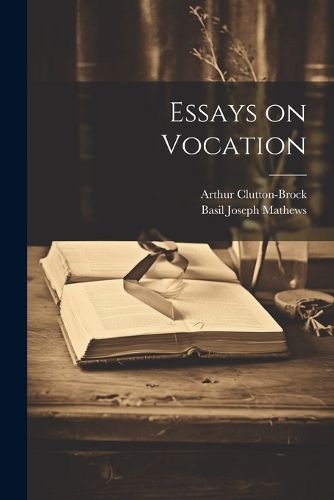Readings Newsletter
Become a Readings Member to make your shopping experience even easier.
Sign in or sign up for free!
You’re not far away from qualifying for FREE standard shipping within Australia
You’ve qualified for FREE standard shipping within Australia
The cart is loading…






This collection of essays, first published in 1914, explores the concept of vocation from a Christian perspective, discussing the meaning of work, the role of the individual in society, and the relationship between faith and calling. The authors, Arthur Clutton-Brock and Basil Joseph Mathews, were both English clergymen and writers who engaged with theological and philosophical issues of their time. Their insights into the nature of vocation remain relevant and thought-provoking today.
This work has been selected by scholars as being culturally important, and is part of the knowledge base of civilization as we know it.
This work is in the "public domain in the United States of America, and possibly other nations. Within the United States, you may freely copy and distribute this work, as no entity (individual or corporate) has a copyright on the body of the work.
Scholars believe, and we concur, that this work is important enough to be preserved, reproduced, and made generally available to the public. We appreciate your support of the preservation process, and thank you for being an important part of keeping this knowledge alive and relevant.
$9.00 standard shipping within Australia
FREE standard shipping within Australia for orders over $100.00
Express & International shipping calculated at checkout
This collection of essays, first published in 1914, explores the concept of vocation from a Christian perspective, discussing the meaning of work, the role of the individual in society, and the relationship between faith and calling. The authors, Arthur Clutton-Brock and Basil Joseph Mathews, were both English clergymen and writers who engaged with theological and philosophical issues of their time. Their insights into the nature of vocation remain relevant and thought-provoking today.
This work has been selected by scholars as being culturally important, and is part of the knowledge base of civilization as we know it.
This work is in the "public domain in the United States of America, and possibly other nations. Within the United States, you may freely copy and distribute this work, as no entity (individual or corporate) has a copyright on the body of the work.
Scholars believe, and we concur, that this work is important enough to be preserved, reproduced, and made generally available to the public. We appreciate your support of the preservation process, and thank you for being an important part of keeping this knowledge alive and relevant.